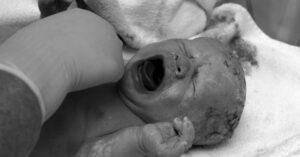The Truth About Birth
First a word or two about birth physiology: Labor is almost universally painful for birthing parents and sometimes painful for babies. One of the ways we cope with pain is to produce beta-endorphin. Beta-endorphin is an opiate-like brain chemical – the same one responsible for the so-called runner’s high. It reduces pain.
What Happens as Labor Progresses?
In a typical labor, the pain for the birthing parent increases over time. As the pain increases, the production of beta-endorphin also increases. Birthing parents and babies both produce beta-endorphin. In birth, the babies produce a little and the parents produce a lot. Research has established that beta-endorphin produced by the parent freely passes to the baby through the placenta.
What Happens at the Moment of Birth?
At the moment of birth the pain of labor suddenly and dramatically decreases for the birthing parent. Parents and babies are flooded with endorphins that, with little to no pain, cause euphoria.
Recreating a Peak Experience
We know that endorphins create a state of dependence. After a medically undisturbed birth, the parent and baby will repeatedly seek to recreate that initial high of birth euphoria with close skin to skin contact. Endorphins and oxytocin (the love hormone) are released during each breastfeeding session to facilitate this process. We know that babies need this contact to survive and develop normally.
Endogenous Pain Relief for Babies
Sometimes babies are hurt in the birth process. It’s obvious when they come out with swelling, bruises or broken bones. Sometimes they appear frightened or shocked. In that moment they are supposed to rely on an extra boost of endorphins from their parents.
The Real Truth
Parents who have epidurals experience little to no pain in their labors. If parents experience little to no pain, they produce little to no beta-endorphin. When parents produce little to no beta-endorphin, their babies have more painful births. This pain could be extreme. This pain can interfere with bonding. We have no idea what the lifetime effects of this could be.
Some people say they think the medication in epidurals goes directly to the baby and makes them sleepy. What those people don’t realize is that the medication in epidurals is mostly a stimulant — not a drug that would make anyone sleepy. It is delivered into an area of mostly fatty tissue near the parent’s spinal cord. The drug bathes the spinal nerve roots and causes a loss of sensation in the areas of the body supplied by those nerves. It does not go into the mother’s or the baby’s blood circulation.
I, too, have seen babies (who are born to parents who have opted for an epidural) seem to behaviorally “check out” after they are born. I believe they are leaving their bodies because they are in pain.
I know this is sobering information.
